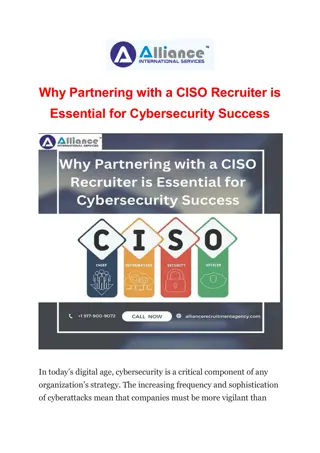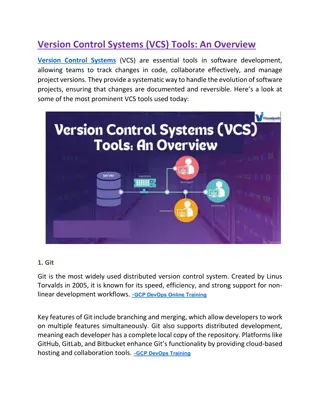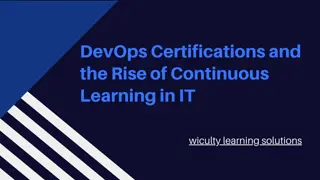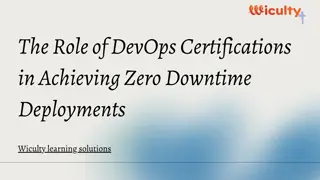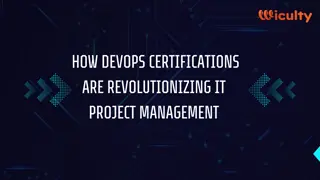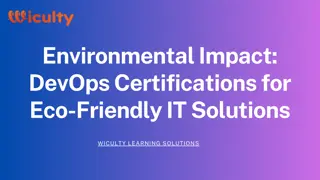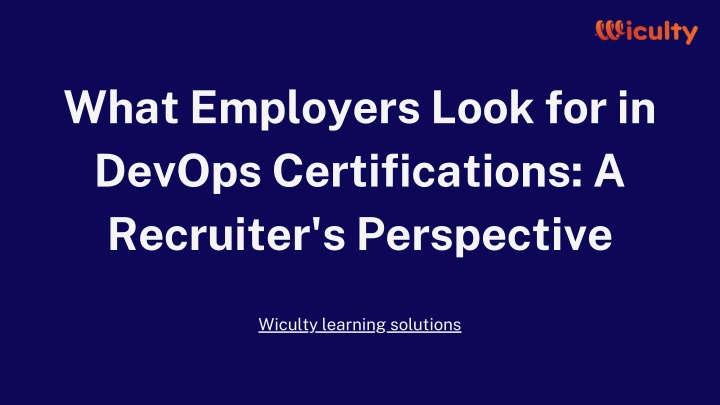
What Employers Look for in DevOps Certifications A Recruiter's Perspective
DevOps certifications play a crucial role in the hiring process, serving as a key indicator of a candidateu2019s skills and knowledge. However, from a recruiter's perspective, the value of these certifications goes beyond the certificate itself. Employers look for certifications that are relevant, comprehensive, practical, credible, and up-to-date. Additionally, they seek candidates who not only have the technical prowess but also possess the soft skills necessary to thrive in a collaborative DevOps environment.n
Download Presentation

Please find below an Image/Link to download the presentation.
The content on the website is provided AS IS for your information and personal use only. It may not be sold, licensed, or shared on other websites without obtaining consent from the author. If you encounter any issues during the download, it is possible that the publisher has removed the file from their server.
You are allowed to download the files provided on this website for personal or commercial use, subject to the condition that they are used lawfully. All files are the property of their respective owners.
The content on the website is provided AS IS for your information and personal use only. It may not be sold, licensed, or shared on other websites without obtaining consent from the author.
E N D
Presentation Transcript
What Employers Look for in DevOps Certifications: A Recruiter's Perspective Wiculty learning solutions
In the fast-evolving world of technology, DevOps has emerged as a crucial practice, bridging the gap between development and operations to streamline and enhance software delivery. As businesses increasingly adopt DevOps methodologies, the demand for skilled DevOps professionals has surged. This demand, in turn, has led to a proliferation of DevOps certifications. But what exactly are employers looking for when they assess these certifications? In this article, we delve into a recruiter's perspective on what makes a DevOps certification valuable.
The Importance of DevOps Certifications DevOps certifications serve as a benchmark of a candidate s knowledge and skills in the field. They provide a standardized way for employers to assess the capabilities of potential hires. However, not all certifications are created equal. Recruiters look for specific qualities in these certifications to ensure they are bringing the right talent on board.
Key Factors Employers Consider 1. Relevance to Industry Standards Employers prefer certifications that align with current industry standards and practices. Certifications from recognized bodies such as the DevOps Institute, Amazon Web Services (AWS), Google Cloud Platform (GCP), and Microsoft Azure are highly regarded. These certifications are designed and updated regularly to reflect the latest trends and technologies in DevOps. 2. Comprehensive Coverage A good DevOps certification should cover a wide range of topics including continuous integration/continuous deployment (CI/CD), automation, cloud services, monitoring, and security. Employers look for certifications that provide a holistic view of the DevOps lifecycle, ensuring candidates are well- versed in all aspects of the field.
3. Practical Experience Theory alone is not enough. Employers value certifications that include hands-on labs and real-world projects. Practical experience is crucial in DevOps, where candidates must be able to apply their knowledge to solve complex problems and improve processes. Certifications that require candidates to complete projects or case studies demonstrate that they have practical, applicable skills. 4. Level of Certification DevOps certifications come in various levels, from beginner to expert. Employers often look for certifications that match the level of expertise required for the role. For entry-level positions, foundational certifications may suffice, but for senior roles, advanced certifications indicating a deeper understanding and greater experience are preferred.
5. Reputation and Credibility of the Certifying Body The reputation of the organization issuing the certification matters significantly. Certifications from well-known and respected institutions carry more weight. Recruiters often research the certifying body's standing in the industry to ensure the certification is credible and recognized. 6. Continuous Learning and Updates DevOps is a rapidly changing field, and what is relevant today might be outdated tomorrow. Employers look for certifications that require ongoing education and periodic renewal. This ensures that the certified professionals stay current with the latest technologies and practices.
Conclusion In conclusion, DevOps certifications play a crucial role in the hiring process, serving as a key indicator of a candidate s skills and knowledge. However, from a recruiter's perspective, the value of these certifications goes beyond the certificate itself. Employers look for certifications that are relevant, comprehensive, practical, credible, and up-to-date. Additionally, they seek candidates who not only have the technical prowess but also possess the soft skills necessary to thrive in a collaborative DevOps environment. At Wiculty Learning Solutions, we understand these nuances and strive to offer DevOps certification programs that meet these employer expectations. Our courses are designed to provide a thorough understanding of DevOps practices, hands-on experience, and continuous learning opportunities, ensuring our learners are well-prepared to meet the demands of the industry.







